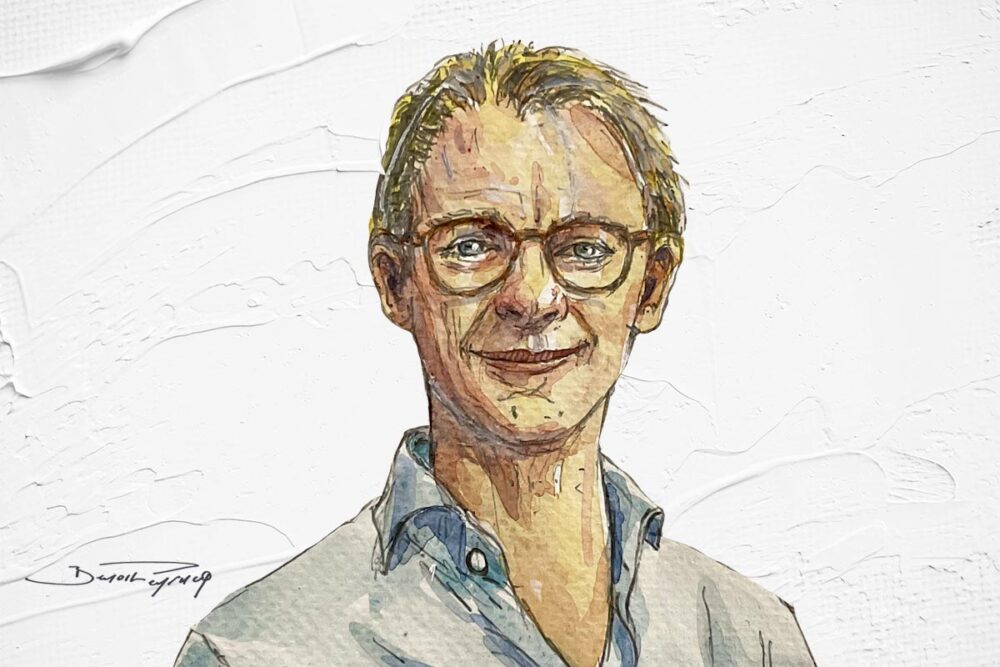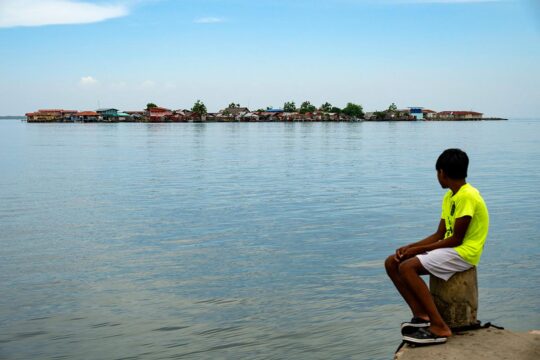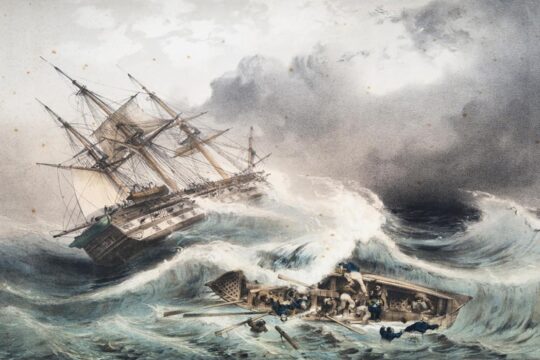LES GRANDS ENTRETIENS JUSTICE INFO
Dennis van Berkel
Dutch lawyer, legal counsel to the Urgenda Foundation, co-founder and strategic advisor to the Climate Litigation Network
JUSTICE INFO: Last 23 July, the International Court of Justice (ICJ) delivered a much awaited advisory opinion on the obligations of states in respect to climate change. What are the main points of this decision according to you?
DENNIS VAN BERKEL: It's a decision which very clearly outlines the climate obligations of states under international law. In quite strong terms, it stated that there are binding obligations on states to reduce their carbon emissions. This was the most pleaded and discussed case before the ICJ: although this is an advisory opinion, nearly 100 countries presented their case. They all recognized the role of the court as the supreme interpreter of their legal obligations, not only because they signed treaties in the past, but by showing up. And especially the high emitting countries, including the United States and China. What they pleaded was twofold. One is that their obligations to reduce emissions were actually very vague, that the Paris Agreement was only an aspirational goal – somewhere between 1,5 and 2°C –, and that the only thing they needed to do was to submit an emission target. The second thing they said is that they can never be responsible for any damage that ever occurs because of climate change.
They were resoundingly refuted on both points. The court was very clear: the rising temperature limit is 1,5°C, not above 1,5°C; and states have quite a narrow space with regards to how to set their targets.
Those targets need to be based on fairness principles, in which every country must pull its weight in the global effort to hold the rise of temperature to 1.5°C, the court said. If you emitted more in the past, you need to reduce your emissions more into the future. It also said that collectively all these targets need to add up towards the 1,5 °C. And they have to set their targets in relation to that remaining space. That's very fundamental because almost no country does that. They just set their target entirely divorced from the science. And therefore they just claim that it's very ambitious and sufficient to stay below 1,5 °C, without showing how they'll get there. The ICJ advisory opinion says you have to give scientific substantiation, you have to base your target on that.
It also said that the targets need to reflect the highest level of ambition. What science is consistently showing is that we can reduce emissions much faster than we're currently doing, and that it's beneficial for all sorts of things other than climate change: health impacts, the economy, etc. So the catering of narrow existing interests, such as the fossil fuel industry, that we are seeing in the US, is blatantly against the international legal obligations that the court has set out.
“What the large polluters asked for was a bank check. And the court didn't give them that at all. They said, no, we have to look at this specifically.”
That’s for the first question the ICJ had to answer on the obligations of states in respect to emissions. For the second question, on the responsibilities high emitting countries have towards vulnerable countries that suffer most from climate impacts, such as small island states, the court said that all responsibilities with regards to climate impact are possible under international law, whether certain damage will have to be repaid, or restitutions. The latter may relate to restoring areas that have been devastated by climate extremes, but potentially also to restore the atmospheric CO2 concentrations that are causing these extremes by drawing carbon back from the atmosphere. What the large polluters asked for was a bank check. And the court didn't give them that at all. They said, no, we have to look at this specifically. And there are two ways. One is whether you have done your part of the effort that is required to reduce emissions. And the other is whether your emissions have contributed to the specific damage which has to be assessed. It's actually a fairly logical statement of the court: if you don't reduce emissions enough, it is an unlawful act under international law, and that can create legal responsibilities for the damage that occurs.
The ICJ also states that law is important, but that it cannot address alone the magnitude of climate change issues. Do you think that this advisory opinion will have an impact on political negotiations at COP30?
Yes, I think it will have impacts in many different ways. One is that it shapes the international political debate. The Urgenda decision in 2015 by a Dutch civil court was the first time that a court said a country had an individual responsibility to do its share, that you have to set your emission target in relation to a temperature limit because if we go above, you are acting unlawfully. And that’s basically what the ICJ has just said at the global level. Prior to that judgment, in politics, everybody said that's nonsense, we have no obligation because we need to have a global agreement on exactly what everybody needs to do. There's no individual responsibility, we can just decide entirely on the basis of what we feel like politically.
There is still discussion on what the right target is, but everybody agrees that the government is obliged to have a target and that target should be sufficient towards 1,5°C. The fact that this is an obligation politicians cannot walk away from has been made very clear with the ICJ advisory opinion. What is also very clear is that if the state doesn't deliver, organizations can go to court. And this is now happening again in the Netherlands. There's a second lawsuit against the Dutch government with regards to the 2030 target, while the Urgenda case was addressing the 2020 target.
“I do believe that these legal developments have shaped up to become one of the most impactful factors driving more ambitious climate action that we've seen in the past 10 years.”
So it shapes the political debate and it creates a legal basis that if not followed, people can go to court and hold politicians to account. What is very significant here is that the ICJ specifically says that if countries do not submit Nationally Determined Contributions (NDCs) that comply with their legal obligations they can be dragged into court and courts can order states to set higher NDCs. So it is not so that with this judgment, we have solved it all. But I do believe that these legal developments have shaped up to become one of the most impactful factors driving more ambitious climate action that we've seen in the past 10 years. From one judgment in one very small country, the Netherlands, to the highest court in the world within 10 years, is lightning fast, if you think about how legal developments usually take place.
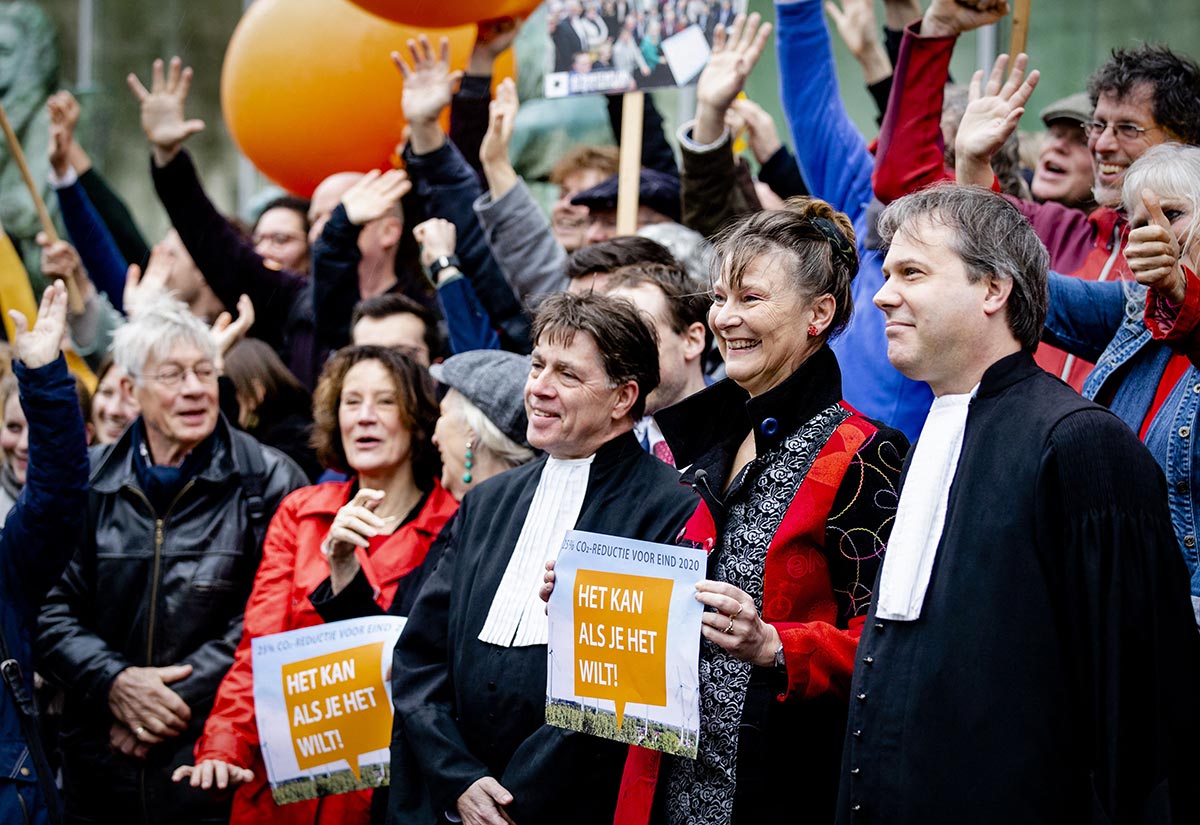
You mentioned the first successful action by the Dutch NGO Urgenda in 2015. Since then many successful climate cases occurred mainly in Europe – Ireland, Belgium, Germany, France… –, but also in Colombia or Pakistan. This happened because NGOs took action in courts. Were they helping one another inside the Climate Litigation Network? Was there a decision in a national court that triggered another decision in another national court?
What you see is a lot of things happening in parallel. It's absolutely true that there's a lot of learning between people that have filed these cases, but also between the courts themselves. But it grew more in an organic way than under one big overarching strategy. I think what happened is that people got disillusioned with the political system. Research shows that 9 in ten of us want stronger climate action from our governments, but they aren't stepping up; they're not sticking to the promises they made in the Paris Agreement. And in different parts of the world, people started to think: what are the legal tools at our disposal? In the past law has already been applied to large societal problems which politics alone did not immediately have an answer for. Legal principles that determined that if you cause harm, you are responsible for the consequences, were now being utilized towards this new and perhaps grandest of all societal problems – climate change. It takes some time and experimentation to apply existing rules to a new set of facts, and that is what you've seen throughout the world.
Among the rights that we have under existing systems, there is the human rights framework. Once using this framework turned out to be successful in the Urgenda case and in the Pakistan Leghari case two months later, more and more people started to look at this and to try and present their cases to courts. This, obviously, takes time. And then there was learning between the groups that were doing this. What are the scientific facts, how to present them, how can we explain the legal rules and how can we explain the obligations in the best way? Although legal systems differ between jurisdictions, a lot of the questions that were in front of them were very similar.
You also saw in judgments that these courts were actually looking at decisions in entirely different jurisdictions, not because they were bound by them, but just to get inspiration of how to deal with these very new questions coming up. What is the position of an individual country in this collective action problem? What is an appropriate standard with regards to what a country is obliged to do? And what is my role as a court vis-à-vis politics given the understanding of separation of powers in a democracy under the rule of law? And you see this kind of dialogue between courts, between plaintiffs in presenting their arguments. And it's through this informal dialogue that this field of law developed at a very rapid pace.
“Both in how they explained the law and how they dealt with the proceedings, the judges really recognized the enormity of the issue and the fact that it was not properly being dealt with by politics.”
The fact that it developed so fast is also because of the urgency of the climate crisis. For instance, in the European Court of Human Rights (ECHR), they gave a particular expedited status to the Senior Women case in April 2024 and that's what you also see with the ICJ judgment. Rulings from international courts like these can take a long time, but in these proceedings the court treated the case with priority and came to very well thought through and reasoned decisions within a relatively short time. Both in how they explained the law and how they dealt with the proceedings, the judges really recognized the enormity of the issue and the fact that it was not properly being dealt with by politics. The courts made it very explicit in their judgments that we need to have some accountability structures and courts are apt to fulfill that role.
In this 10 year journey, which are the other main landmark decisions according to you?
There were many. For the 1,5°C target, there was the 2018 Colombian Supreme Court decision on future generations with regards to the rights of the Amazon and obligations of the government to ensure that emissions from deforestation would be reduced. In 2021, the Neubauer decision of the German Constitutional Court was a very important decision as well. It was the first constitutional court, after the 2019 ruling in the Urgenda case, that determined that a lack of shorter term climate measures threatened the rights of future generations. Another landmark was the decision of the South Korean Supreme Court in August 2024, because it was also on the basis of human rights: it determined that there was an obligation on the government to set targets in line with science. I also think, of course, of the advisory opinions of the International Tribunal for the Law of the Sea (ITLOS) in May 2024 and of the Inter American Court on Human Rights in May 2025.
All of these cases have built one upon another. For instance, the Korean decision very much follows the template that was created by the German Constitutional Court. The ECHR decision on Senior Women also refers to the German Constitutional Court. And the ICJ is following a lot the template of the ECHR. All of these decisions clearly prepared the landscape for the ICJ advisory opinion, because what it has said was no longer revolutionary in any way: many courts had preceded it.
“In the first couple of years, we tried to be this catalyst. But after a while, people saw that this could be done across jurisdictions. So now we no longer need to convince anyone.”
What role did you, Urgenda and the Litigation Network play?
It was a lot about explaining to others what we had done in the Netherlands and to think together how the same legal thinking could be applied in their own jurisdictions. In the early years, there was an overwhelming request from throughout the world of people asking for our help. In the first couple of years, we tried to be this catalyst. But after a while, people saw that this could be done across jurisdictions. So now we no longer need to convince anyone. It's much more that we help people with their cases. And the amount of cases and the number of people that are working in this field across the world have grown enormously. The Climate Litigation Network was first a project of Urgenda. Now it's become an independent organization. It does not bring its own cases, but supports communities that seek to use the law to protect our shared future.
The ICJ decision clearly upgrades the right to a stable climate and a healthy environment to the level of universally acknowledged human rights. Prior to that, the environment was hardly mentioned in universal human rights, if we except the declaration of UN General Assembly on a “clean, healthy and sustainable environment” in July 2022. Was there a strategy from climate activists to achieve this?
Regarding the UNGA resolution recognizing this human right to a healthy environment, many different people have been involved in that for a very long time, who were not directly involved with the litigation. At the same time, people in the litigation started to use existing human rights so that they also grant protection against climate change – such as the right to life, or the right to private life under the European Convention on Human Rights. So the litigation on the one hand and the efforts to get that right recognized at the political level have reinforced each other. And now we have this recognition of the ICJ, which I agree is a great achievement. So it's many different streams that led to that, and not only climate litigation.
“Another significant development is a growing wave of litigation against the corporations that are most responsible for climate change.”
What’s coming next? Could you use the African Charter of Human and Peoples’ Rights, which is more precise than the European Convention of Human Rights on the protection of nature, human health and common heritage?
How the Charter will be used in domestic litigation will be shaped in large part by the upcoming climate change advisory opinion from the African Court. The Court’s findings will be particularly relevant for new fossil fuel projects – there are over 900 new gas projects alone currently planned across the continent. But if we take the global picture, most of these climate cases have rightly focused on the Global North countries that have the highest responsibilities with regards to emissions.
Another significant development is a growing wave of litigation against the corporations that are most responsible for climate change. One important example is a case against Royal Dutch Shell brought by another Dutch NGO, MilieuDefensie, in a Dutch court. Their lawyer Roger Cox is the same person that had filled the Urgenda case. In first instance in 2021, it was the first time that a corporation was acknowledged to have its own responsibilities with regards to emission reductions. In appeal the exact emission reduction order went away – the case is still before the Supreme Court – but very importantly, the appeal court suggested that companies‘ legal obligations may prevent them from drilling for more oil because we have already depleted the available carbon budget. So what MilieuDefensie did is to file a new case with regards to Shell's new oil exploration. There are now two cases before the Dutch courts in parallel: one with regards to emission reduction, and another one that is aimed at the oil exploration.
In the ICJ judgment the court says to the states that there's an obligation not just to see how you reduce your emissions, but also how you regulate corporations to reduce their emissions.
And this somewhat concludes the debate about the responsibilities of states versus the responsibilities of companies that had been opened after the Carbon Majors report in 2017…
Yes. And it's not either or, right? It's both. But states have an obligation to regulate that. And in the Dutch context, the independent responsibility of a corporation in respect to climate change is also established. The court did not acknowledge that this was entirely a political issue and that Shell could do whatever it wanted within the framework set by the legislator. No. Even if the legislator is not forcing you to reduce, as a company you have your own responsibility.
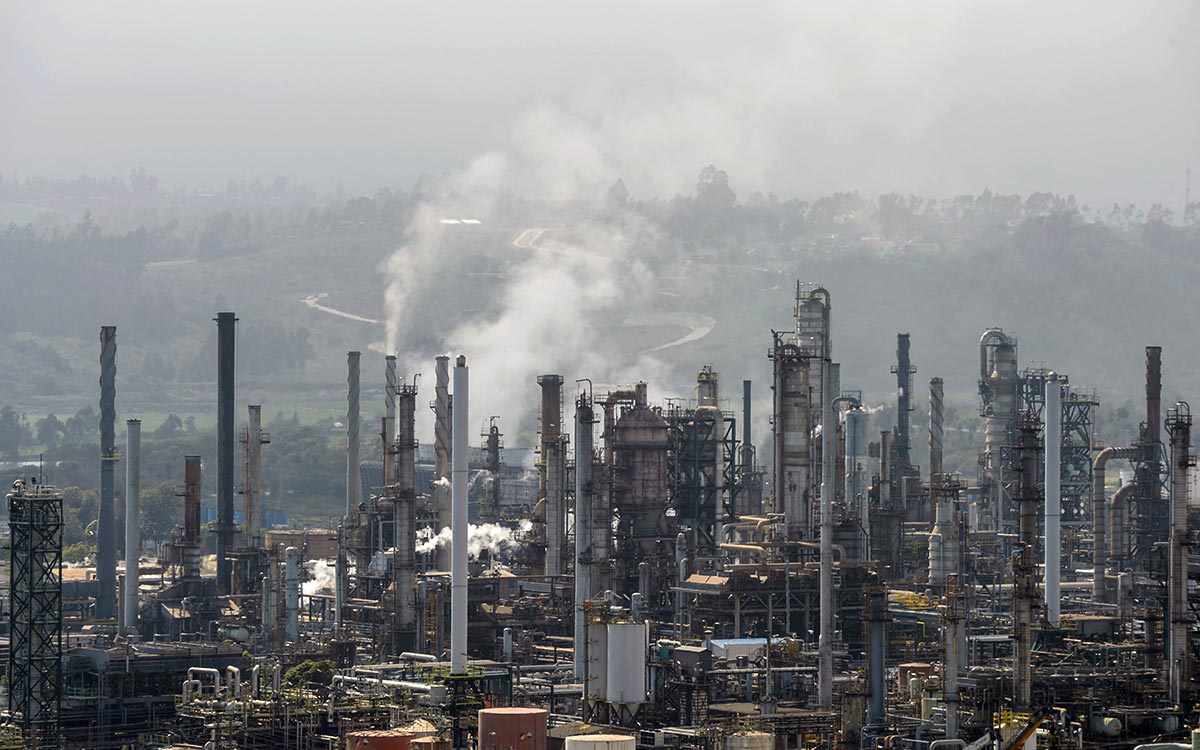
Could we say that because the international environmental law was too weak to address climate change effects and causes, some lawyers took a step aside to address it by making it a human rights issue?
Yes, somewhat. But the most conscious step that was taken was that, rather than raising these cases at the international level, which from a legal point of view might have seemed the most logical, they were taken to the national level. And the national procedures that were used are similar to actions that were used to determine responsibility for asbestos or tobacco harms since the 1990s. The Urgenda case was a case before a civil court. This nationally based environmental and liability jurisprudence was used to create a climate responsibility at the national level, and that has now trickled up to the international level.
“The International Court of Justice has set a non-binding standard and a lot of that will now go back to national cases before national courts with binding judgments. And there the law will develop further.”
The International Court of Justice has set a non-binding standard and a lot of that will now go back to national cases before national courts with binding judgments. And there the law will develop further. The big change that I expect is that governments will now need to be much more explicit with regards to how they set their targets and that there needs to be a scientific basis to that.
Once again, there is an interplay between courts and politics. These court cases strengthen the decision democratic process in two ways. First, they give a much clearer factual basis under the policies. Governments have to justify that what they're doing is actually enough to reach the 1,5°C target. They can't just claim any more that what they're doing is enough. And the other thing is that these judgments say you have to act now, you can't postpone this because the burden on future generations will be enormous. That is extremely important for democratic freedoms because if you don't act now, the scope to take actions into the future becomes less and less. To protect the right of the people in 10 years to actually still make decisions on how to do things, rather than to be confronted with a carbon lockdown, it is important that governments take all the actions that they can take immediately.

Dennis van Berkel is a Dutch lawyer. He joined Urgenda Foundation in 2013. He was involved with the Urgenda case before the Dutch courts until its final resolution in 2019. He co-founded the Climate Litigation Network in 2016 and was its director until 2023. He is now a strategic advisor to the network, and still legal counsel to the Urgenda foundation.


